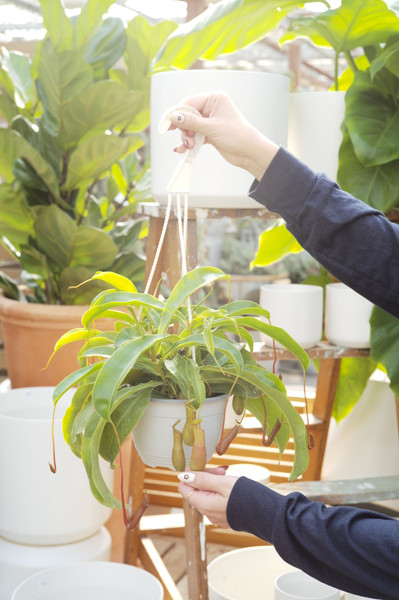Nepenthes
Posted by Hannah Brand on Oct 15th 2023
Nepenthes
Hey Plant Friends!
This week we are talking about Nepenthes, more commonly known as Pitcher Plant. This carnivorous plant belongs to the Nepenthaceae family and is native to Southeast Asia including Borneo, Sumatra, Malaysia, the Philippines, India, and northern Australia. Nepenthes grow long pitchers, which are actually specialized leaves. These leaves attract flying and crawling insects into their cupped leaves with nectar and visual cues distinguished by coloration. The rim of each pitcher is slippery causing prey to fall into the cavity where digestive enzymes work to create nutrients for the plant. Genius! If you are new to carnivorous plants, this is a great place to start as there is a diverse array of cultivars available.
Let’s talk about care. Grow Nepenthes in a few hours of direct sun, then bright indirect light for the remainder of the day. Direct sun in the morning is ideal. When it comes to watering, Nepenthes can be picky and don’t like the high minerality of tap water. Water with distilled or reverse osmosis water. Rainwater is also a great option. Keep evenly moist and never let carnivorous plants completely dry out. Repot in a carnivorous plant specific substrate with low mineral content, good water retention, and the ability to drain. We recommend The Killer Plant Company’s Carnivorous Soil which contains peat moss and perlite. Nepenthes require an environment with high humidity. Misting often, adding a humidifier to your room, or growing in a terrarium are great ways to increase humidity. Keep away from cold drafts as carnivorous plants can be sensitive to temperature drops. Brown pitchers are common, simply prune them out to make room for new growth. Common pests to keep an eye out for are mealybugs, scale, and thrips. Using insecticidal sprays is not recommended as this can cause damage. Manually removing pests is the best practice.
We currently carry Nepenthes in 2” pots and 6” hanging baskets in the greenhouse. If you have additional questions feel free to reach out to us by phone, Instagram, or email us at hello@tonkadale.com.
Happy Planting!

